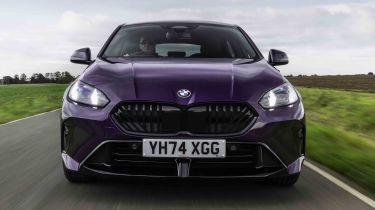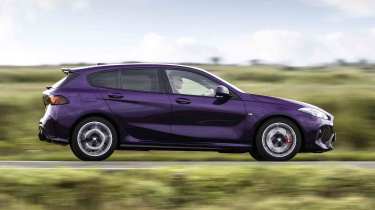BMW 1 Series review – MPG, running costs & CO2
The BMW 1 Series doesn't sacrifice performance for economy
The BMW 1 Series engine lineup has been heavily cut down since its facelift in 2024. Just the mild-hybrid 120 model remains for the standard car, while the high-performance M135 also lives on.
These are very efficient and capable engines, but we do think it’s a shame the 118d and 120d diesel options have been dropped (due to low demand according to BMW) as they’d still make sense for distance drivers. There’s currently no plug-in hybrid or fully-electric option offered.
BMW 1 Series MPG & CO2
The sole petrol option left in the standard 1 Series lineup is now the 120. This is a turbocharged 1.5-litre mild-hybrid assisted engine that boasts an impressive 52.3mpg. For context the Mercedes A 180 gets up to 47.1mpg while even the Audi A3 gets 2.7mpg fewer than the 1 Series. CO2 emissions stand at 121-122g/km.
The high-performance M135 is unsurprisingly more thirsty and will be the most expensive 1 Series to run, but it’s not too bad when compared to rival hot hatches. It’s capable of up to 36.7mpg which is better than a Mercedes-AMG A 35 and Audi S3, which both get 33.3mpg. CO2 emissions are also higher than in the standard 120, with the M135 producing 174g/km and sitting in a BiK band that will make it a pricey pick for company-car choosers.
The efficient 116d and 120d diesel models are no longer offered, so if you want to get your hands on one you’ll have to buy a used example. These were a good option for buyers covering longer motorway miles more often.
More reviews
Car trim reviews
In-depth reviews
- BMW 1 Series review – the keen driver’s premium hatchback pick
- BMW M135i review – a fast and practical hot hatch, but lacks character
- BMW 1 Series coupe (2008-2014)
Road tests
Used car reviews
Pick a 116d and you'll be getting a 1.5-litre three-cylinder that used to be shared with the MINI range. It's thrifty, managing up to 62.8mpg with a manual and 61.4mpg with an automatic gearbox, while CO2 emissions stand at just 119g/km and 120g/km, respectively with smaller alloy wheels fitted.
The 120d is bigger, using a 2.0-litre diesel fitted with 'multi-stage' turbocharging for greater efficiency. The front-wheel drive 120d becomes available from the Sport trim, and is capable of up to 57.6mpg and emissions of 129g/km.
Insurance groups
Insurance groups for the BMW 1 Series range from 21 in the 120 in Sport and M Sport trim to 29 in the M135 xDrive – that’s actually lower than the group 39 rating from the outgoing M135i xDrive.
Warranty
Every BMW comes with a three-year, unlimited mileage warranty that also includes roadside assistance. It equals the deal offered by Mercedes and can be increased in length for an additional cost.
Servicing
Sensors in the car keep watch over the oil quality and alert you when it deems a service is required, usually between one or two years and less than 20,000 miles apart. Customers can also opt for a BMW service plan, paying a monthly sum to cover routine maintenance instead of being stung by unexpected bills.











